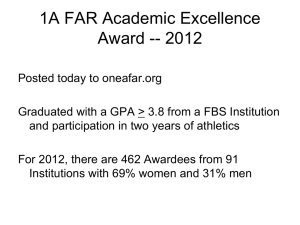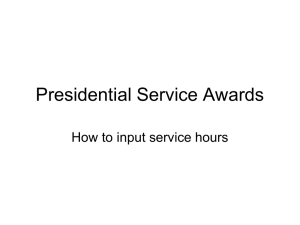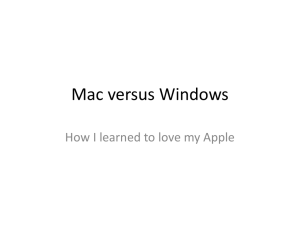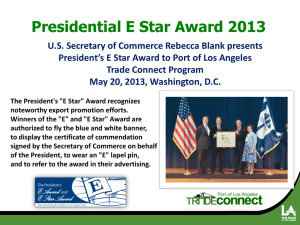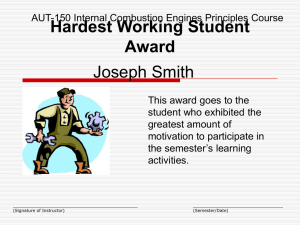NCMA MACandLEAD Presentation Mar10
advertisement
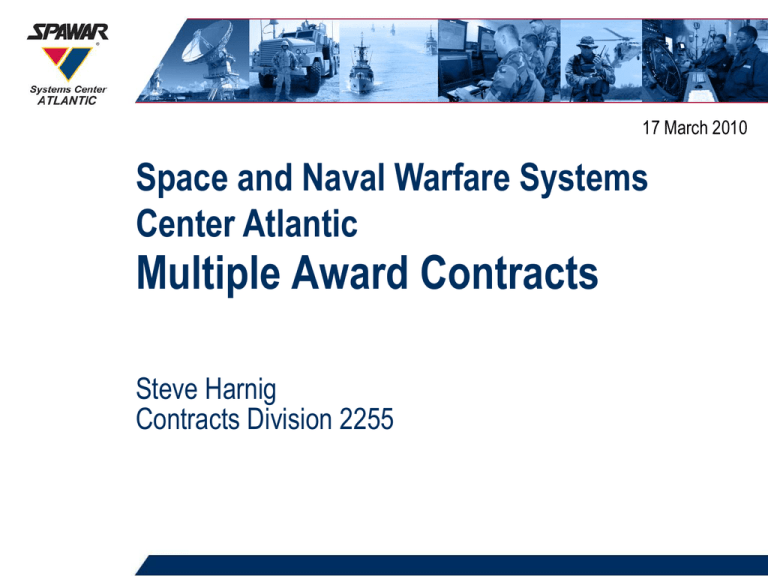
17 March 2010 Space and Naval Warfare Systems Center Atlantic Multiple Award Contracts Steve Harnig Contracts Division 2255 1 BACKGROUND ▼ Sect. 843 of the National Defense Authorization Act FY08 Enhanced competition requirements for task and delivery order contracts (IDIQs) Prohibits award of single source IDIQs with limited exceptions − Approval thresholds – $10M and below require CCO approval − $10M to $100M require HCA approval − Greater than $100M require ASN approval ▼ Increase speed to capability with quick response IDIQ vehicles 2 CURRENT MACS IN SPAWAR ATLANTIC ▼ PBX Routers and Switches (8(a) set-aside; 9 awardees) ▼ Program Management/Engineering Services (8(a) set- aside; 33 awardees) ▼ Network Centric Services (unrestricted; 2 awardees) ▼ Satellite Communications Equipment (SB set-aside; 8 awardees) ▼ Portable SATCOM Terminals (unrestricted; 7 awardees) ▼ Automated Fuel Handling (unrestricted; 3 awardees) ▼ Radio Telephone Equipment (8(a) set-aside; 4 awardees) 3 MACS IN PROGRESS AT SPAWAR ATLANTIC ▼ N65236-06-R-0832 – Telephony ▼ N65236-08-R-0016 – ISEA Support Services ▼ N65236-08-R-0027 – Automated Fuel Handling Services ▼ N65236-09-R-0012 – Joint Basing and Technology Transition Support ▼ N65236-09-R-0019 – AV Hardware ▼ N65236-10-R-0002 – C4ISR/IT Support for Multiple AORs ▼ Command-Wide Supply MACs N65236-08-R-0070 – Intelligence, Surveillance, and Reconnaissance (ISR) N65236-08-R-0077 – Command and Control (C2) N65236-08-R-0098 – Communications Equipment 4 LESSONS LEARNED/AREAS FOR IMPROVEMENT ▼ Contracts Department conducted a Lean Six Sigma Event to address following areas identified on current MACs as possible improvements: Use of Statement of Objectives (SOO) Source Selection Plan and Evaluation Matrix Exemption to Fair Opportunity and Brand Name Justification Solicitation Discussions and Clarifications Business Clearance Memo and Source Selection Memo 5 LESSONS LEARNED/AREAS FOR IMPROVEMENT ▼ Use of Statement of Objectives (SOO) Goals = Standard Format, Improved Description of Objectives Better SOOs will result in better competition on each MAC order SOO should result in well written Performance Work Statement ▼ Source Selection Plan and Evaluation Matrix Goals = Standard Template for SSPs, Standard Method of Evaluation Standardization will result in better competition and enhance understanding of how we evaluate proposals Consistent use of SSPs and Evaluation methodology will ensure quality source selections 6 LESSONS LEARNED/AREAS FOR IMPROVEMENT ▼ Exemption to Fair Opportunity and Brand Name Justification Goals = Template for Exemption and Justification Template will ensure that each exemption or justification is adequately documented Standardization will enhance understanding of the process ▼ Solicitation Goals = Standard format for solicitations Standardization will improve quality of proposals (consistent) 7 LESSONS LEARNED/AREAS FOR IMPROVEMENT ▼ Discussions and Clarifications Goals: Create a standard process for conducting discussions or clarifications Standard process will improve quality of competition and ensure quality source selection decisions ▼ Business Clearance Memo and Source Selection Memo Goals: Templates for each memo Standardization will improve the quality of each memo and ensure that business decision are properly documented 8 LESSONS LEARNED/AREAS FOR IMPROVEMENT ▼ Each team has completed the initial improvement event ▼ Goal is to roll out improvements this quarter ▼ Continuous process improvement on all MACs Growth area since this contract type is mandated 9 Best Practices from Current MACs ▼ Industry Days on new, large MACs Enhance understanding of requirements and improve competition ▼ Periodic (Quarterly) Contract Reviews Meet with each MAC holder Discuss issues (what is working, what can be improved) ▼ Open Communication In addition to periodic reviews, government and industry partner to make the MAC mutually beneficial for each program Share ideas for improvements, ensure optimum competition on orders ▼ Definitive Contracts Identify requirements that can be awarded on contracts other than IDIQs 10 Best Practices from Current MACs ▼ Multiple Award Approach RFPs may include language limiting anticipated number of awardees Use E-Commerce for task order competitions ▼ Contract Ceilings Set ceilings on each MAC award in aggregate amount for all orders placed under the MAC − Example: $250M MAC award to 3 awardees. All 3 contract awards will reflect a ceiling of $250M; however, this amount is shared across all 3 awardees. Through task order competition, the total value of awards made under the MAC cannot exceed $250M. 11 Leading Contract Professionals ▼ Challenges High workload Contracting is an art Constant change in policy and procedures Contracts are the end of the acquisition process Contract award lacks sense of accomplishment 12 Leading Contract Professionals ▼ High Workload Despite Economic Conditions – DOD spending continues at a high pace Due to lack of contracting knowledge in technical teams, work is difficult and requires flexibility Balance of pre and post award actions ▼ What can a leader do? Develop leaders in the acquisition process − Empowered accountability 13 Leading Contract Professionals ▼ Contracting is an art The more complex the action, the less standardized the process No acquisition is exactly the same as another Acquisitions are done through teams, teams are made of individuals, individuals introduce variation ▼ What can a leader do? Create processes and train professionals to think within the process (not rely on the process completely) Enhance training with real-life examples − Concentrate on unique issues experienced Develop teaming skills/facilitation skills/leadership skills to work more effectively in team setting 14 Leading Contract Professionals ▼ Constant change in policy and procedures Maintain balance with policy changes and workload Working in constant change may feel like chaos ▼ What can a leader do? Leverage strengths on team (some people are good with policy) Monitor amount of change on your team − Learning zone versus chaos zone Centralize concerns with policy − Leader needs to consolidate concerns and determine proper implementation of policy 15 Leading Contract Professionals ▼ Contracts are the end of the acquisition process Lead time has been used by the time it gets to Contracts − Pressure from customers − Deadlines are unrealistic ▼ What can a leader do? Support your team and your leaders − Establish where concerns are directed − Ensure your leaders know how to use you Insist on realistic milestones in the acquisition process − Have to engage early and often − Manage expectations Educate customers 16 Leading Contract Professionals ▼ Contract award lacks sense of accomplishment Workload forces professionals to move immediately to the next task Contract is on paper (rarely a masterpiece) ▼ What can a leader do? Create the sense of accomplishment Use goals (i.e., quarterly awards) Celebrate accomplishments (publicly) Educate employees on the larger goals and how they impact them − Success towards large goals 17
